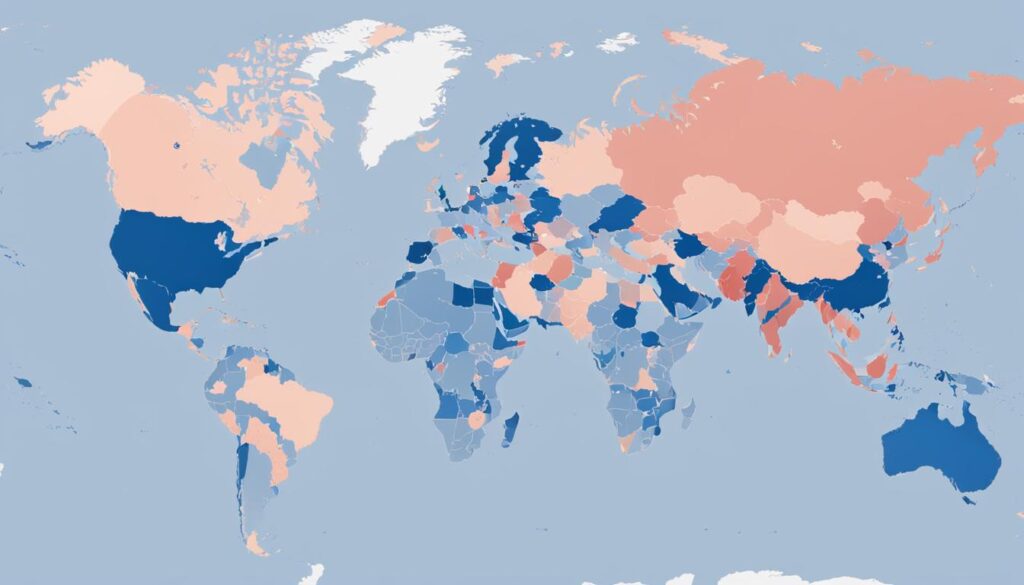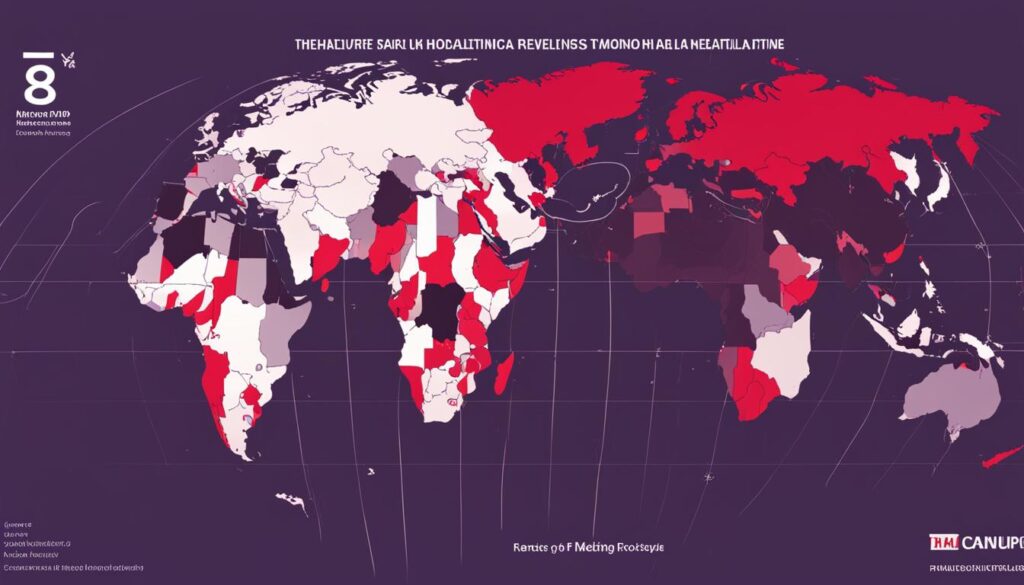Explore Global Healthcare Rankings by Country Today!

Welcome to our in-depth analysis of global healthcare rankings by country. In this article, we will delve into the latest findings and provide valuable insights into the performance of healthcare systems around the world. Whether you’re curious about which countries have the best healthcare or want to understand how the United States ranks, we’ve got you covered. So, let’s dive in!
But first, let’s take a look at the big picture. The Global Health Security Index (GHS Index) measures the capacities of 195 countries to prepare for epidemics and pandemics. Unfortunately, the results show that all countries remain dangerously unprepared for future threats. With an average score of 38.9 out of 100 in 2021, it’s clear that there are significant weaknesses in global health security. Even high-income nations have not made sufficient financial investments in epidemic or pandemic preparedness.
Key Takeaways:
- The GHS Index reveals that all countries, including high-income nations, are unprepared for future epidemic and pandemic threats.
- The average country score in 2021 was 38.9 out of 100, indicating continued weaknesses in global health security.
- Most countries have neglected the preparedness needs of vulnerable populations, putting them at risk.
- Political and security risks have increased in nearly all countries, further impacting healthcare systems.
- Countries are not adequately prepared to prevent globally catastrophic biological events.
Now that we have a better understanding of the global healthcare landscape, let’s explore which countries are leading the pack in terms of healthcare excellence and where the United States stands. Stay tuned!
Which Countries Have the Best Healthcare?
When it comes to healthcare, some countries stand out as leaders in providing high-quality services and achieving positive health outcomes. Healthcare system comparisons show that Norway, the Netherlands, and Australia are considered to have the best healthcare systems in the world. These countries prioritize accessibility, affordability, and overall healthcare quality.
In a report by the Commonwealth Institute, Norway ranked at the top due to its comprehensive and accessible healthcare system. The Netherlands is renowned for its strong primary care and patient-centered approach, while Australia boasts universal healthcare coverage and excellent health outcomes. These countries have made significant investments in healthcare infrastructure, ensuring that their citizens have access to timely and top-notch medical care.
On the other hand, the United States consistently ranks lower in healthcare system comparisons. The Commonwealth Fund consistently places the United States at the bottom of the list in terms of healthcare performance. Factors such as limited access to care, high costs, and uneven quality contribute to these rankings. It is crucial for countries to learn from those with successful healthcare systems and work towards improving their own to provide better healthcare outcomes for their populations.
The Importance of Healthcare Quality Rankings
Healthcare quality rankings by country serve as a valuable tool for policymakers, researchers, and healthcare professionals. These rankings provide insights into the strengths and weaknesses of different healthcare systems, allowing countries to learn from one another and implement best practices. By examining the top healthcare countries, policymakers can identify areas for improvement and make informed decisions to enhance their own healthcare systems.
Furthermore, healthcare quality rankings help drive competition and inspire innovation. Countries that aspire to be at the forefront of healthcare strive to improve their rankings, leading to advancements in medical research, technology, and patient care. These rankings also encourage transparency and accountability within healthcare systems, as countries are measured against global standards of healthcare quality.
Ultimately, the aim is to achieve equitable access to healthcare, affordable medical services, and improved health outcomes for all individuals. By studying the countries with the best healthcare systems in the world, it is possible to establish benchmarks for excellence and work towards achieving the highest standards of care.
How Does the United States Rank in Healthcare?
When it comes to international healthcare rankings, the United States consistently falls behind other countries. According to the Commonwealth Fund, the United States ranks last in terms of access to care, administrative efficiency, equity, and healthcare outcomes. This raises concerns about the affordability of healthcare and the overall performance of the system. Despite spending a significant portion of its gross domestic product on healthcare, the United States still lags behind in comparison to other countries.
The World Health Statistics report further supports this analysis, highlighting the disparities in healthcare performance globally. The United States, known for its technological advancements and medical innovations, still faces challenges in ensuring universal access to care and delivering quality healthcare outcomes. Premature deaths from heart disease, diabetes, and drug overdoses continue to be major issues within the country.
These rankings underscore the importance of healthcare research and analysis in understanding the strengths and weaknesses of different healthcare systems. By examining international healthcare rankings, policymakers, researchers, and healthcare professionals can identify areas for improvement and implement strategies to enhance healthcare delivery in the United States.

As the United States seeks to improve its healthcare system, it must prioritize investments in healthcare infrastructure, workforce development, and preventative measures. Emphasizing preventive care and addressing the social determinants of health can contribute to better health outcomes and reduce healthcare disparities within the country. By learning from the best healthcare systems in the world and implementing evidence-based practices, the United States can strive towards providing comprehensive, accessible, and high-quality healthcare for all its citizens.
What Are the Countries with the Worst Healthcare?
When it comes to healthcare, some countries face significant challenges in providing access to quality healthcare services and improving overall health outcomes. According to the Legatum Prosperity Index, the countries with the worst healthcare systems include Central African Republic, South Sudan, Chad, Lesotho, and Somalia.
These countries struggle with several issues, including limited access to healthcare services, poor healthcare infrastructure, and a lack of resources. As a result, their populations often experience higher rates of preventable diseases, lower life expectancies, and poorer healthcare outcomes overall. The rankings serve as a reminder of the disparities in healthcare across different regions of the world.
While efforts are being made to improve healthcare in these countries, it requires significant investments in infrastructure, healthcare workforce development, and access to essential resources. By addressing these challenges, these countries can pave the way for better healthcare outcomes and improved quality of life for their populations.

The Impact of Poor Healthcare
The consequences of having a struggling healthcare system are far-reaching. In countries with the worst healthcare, individuals face greater barriers to receiving timely and appropriate care, leading to higher rates of morbidity and mortality. Limited access to healthcare services also contributes to the cycle of poverty, hindering economic growth and development.
Furthermore, the burden of poor healthcare extends beyond individual lives and affects the overall social and economic well-being of these nations. When healthcare systems are under-resourced and inefficient, it becomes challenging to address public health crises effectively and respond to epidemics and pandemics.
While addressing the challenges faced by these countries requires time and concerted efforts, it is crucial for the international community to offer support and collaborate in finding sustainable solutions. By working together to improve healthcare infrastructure, access to medical resources, and healthcare delivery systems, we can help these countries overcome the obstacles and provide better healthcare for their populations.
The Importance of Global Health Data
Global health data is invaluable in analyzing and ranking healthcare systems worldwide. It enables healthcare professionals, policymakers, and researchers to gain insights into the performance of healthcare systems and identify areas for improvement. By collecting and analyzing data from member states, organizations like the World Health Organization (WHO) can assess health indicators and track progress towards global health goals.
Healthcare analysis and rankings rely heavily on global health data to provide a comprehensive understanding of healthcare systems. The data allows for comparisons between countries, highlighting disparities and identifying best practices. It helps policymakers make informed decisions, allocating resources where they are needed most and implementing evidence-based policies to improve healthcare outcomes.
High-quality healthcare research and analysis are dependent on access to reliable and up-to-date global health data. It serves as the foundation for evidence-based research, enabling researchers to identify trends, patterns, and correlations that can drive improvements in healthcare delivery. Global health data also plays a crucial role in monitoring the impact of interventions and measuring progress towards global health targets.
Driving Improvements in Healthcare
By harnessing the power of global health data, we can drive improvements in healthcare on a global scale. The insights derived from data analysis can inform strategies to strengthen healthcare systems, enhance access to care, reduce disparities, and ultimately improve health outcomes for populations worldwide.
As we continue to collect and analyze global health data, it is essential to prioritize data transparency, accuracy, and accessibility. This includes standardizing data collection methods, ensuring the privacy and security of data, and promoting international collaboration in data sharing. By working together, we can unlock the full potential of global health data and pave the way for a healthier future.
Future Trends in Global Healthcare Rankings
As the world continues to grapple with the impact of the COVID-19 pandemic, the importance of healthcare rankings by country has become more evident than ever before. These rankings provide valuable insights into the performance of healthcare systems and highlight areas for improvement. Moving forward, global healthcare rankings will continue to focus on indicators such as access to care, healthcare outcomes, equity, and efficiency.
The COVID-19 pandemic has served as a wake-up call for countries worldwide, emphasizing the need for preparedness and resilience in healthcare systems. As a result, future rankings may place greater importance on these factors. The ability of a country to effectively respond to epidemics and pandemics will be a key consideration in global healthcare rankings.
To improve their healthcare systems and climb up the global rankings, countries must prioritize investments in healthcare infrastructure, workforce development, and preventative measures. Building robust healthcare infrastructure is crucial to ensure that all individuals have access to quality care when they need it. Additionally, investing in the development of a skilled healthcare workforce will contribute to better health outcomes. Lastly, preventative measures such as promoting healthy lifestyles and early disease detection can significantly improve population health.
By focusing on these key areas, countries can work towards achieving better healthcare performance and ultimately improve the well-being of their populations. Global healthcare rankings provide a roadmap for countries to identify areas for improvement and guide policy decisions. As we navigate the future, let us prioritize the importance of healthcare analysis and rankings to ensure that every country strives towards the goal of delivering quality healthcare for all.
FAQ
What is the GHS Index?
The GHS Index measures the capacities of 195 countries to prepare for epidemics and pandemics.
Are countries prepared for future epidemics and pandemics?
No, all countries remain dangerously unprepared for future epidemic and pandemic threats.
How do countries score in global health security?
The average country score in 2021 was 38.9 out of 100, showing continued weaknesses in global health security.
Have countries made financial investments in epidemic or pandemic preparedness?
Most countries, including high-income nations, have not made dedicated financial investments in strengthening epidemic or pandemic preparedness.
Have political and security risks increased?
Yes, political and security risks have increased in nearly all countries.
Are vulnerable populations being neglected in terms of preparedness needs?
Yes, countries are continuing to neglect the preparedness needs of vulnerable populations.
Can countries prevent globally catastrophic biological events?
No, countries are not prepared to prevent globally catastrophic biological events that could cause damage on a larger scale than COVID-19.
Which countries have the best healthcare?
According to the Commonwealth Institute, in 2021, the countries with the best healthcare were Norway, the Netherlands, and Australia.
How does the United States rank in healthcare?
The United States consistently ranks low in international healthcare rankings and is ranked last by the Commonwealth Fund.
What are the countries with the worst healthcare?
According to the Legatum Prosperity Index, the countries with the worst healthcare systems include Central African Republic, South Sudan, Chad, Lesotho, and Somalia.
How important is global health data?
Global health data plays a crucial role in understanding healthcare systems and identifying areas for improvement.
What are future trends in global healthcare rankings?
Future trends in global healthcare rankings will continue to focus on indicators such as access to care, healthcare outcomes, equity, and efficiency.



